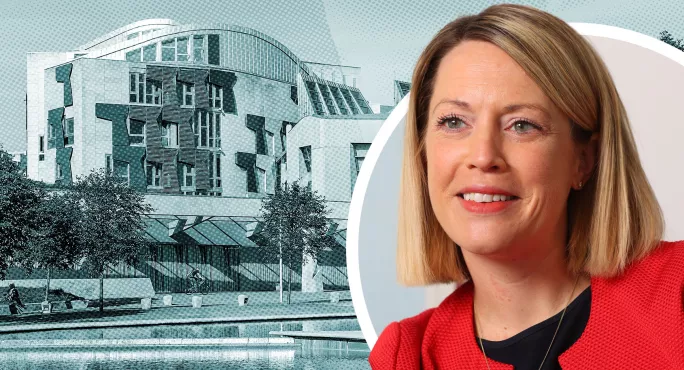Gilruth vows to increase teacher numbers under new deal with councils

The Scottish government today set out its plans for education after coming under fire for its failure to address some major issues, including lack of support for pupils with additional support needs (ASN), poor employment prospects for new primary teachers and reform to the qualifications system.
Education secretary Jenny Gilruth announced a new deal with councils and the creation of a “Joint Education Assurance Board”.
Through the deal, councils would receive “an extra £69 million…to restore teacher numbers to 2023 levels next year”.
The £145.5 million to protect teacher numbers would be increased by £41 million, she said, and funding of £28 million would be given to councils to support ASN and “employ more specialist staff, such as ASN teachers”.
This is an updated figure after last week’s Scottish Budget saw a £29 million ASN plan announced.
Learning hours to be frozen
Ms Gilruth also said that local authorities had agreed to freeze learning hours after some councils hit the headlines for looking at cutting the time pupils spend in class to save money.
On Thursday, Falkirk Council is due to rule on controversial plans to reduce pupil learning hours.
The agreement reached between councils and the government, she said, also contained a commitment to “progressing reduced class-contact time”. Ms Gilruth said she wanted to “rapidly bring forward a joint proposal to the Scottish Negotiating Committee for Teachers to make progress at pace”.
- Background: Number of teachers in Scottish primaries drops by over 600 in a year
- Related: ‘Teaching has become a precarious job’
- News: ‘Explosion’ in ASN numbers sees schools struggling
Some had anticipated a clear timeline for changes to Scottish education, which was not forthcoming in today’s statement.
That was because in September, in her long-awaited response to the Hayward review of qualifications and assessment, Ms Gilruth had promised to “set out a fresh national approach to educational improvement later this year”, adding: “The new plan will set out the short-, medium- and longer-term priorities for Scottish education, with a clear focus on excellence and equity through improvement.”
However, there was no specific timeline of targets and priorities in her statement in the Scottish Parliament this afternoon.
In her response to Ms Gilruth’s statement, Labour education spokesperson Pam Duncan-Glancy said: “I’m afraid, with no specifics on a change of direction and little reflection on the reality facing schools today, this is more of the same. It isn’t a strategy and it isn’t long term.
“Indeed, we’re told, after waiting [until today], to wait again for more detail in the new year.”
The education secretary did acknowledge the “distress and anguish” caused to teachers by a lack of permanent posts, “particularly post-probation”.
She said the allocation of the additional £69 million would “help local authorities provide greater job security”.
Teacher numbers fell in most councils
Figures published today showed that just 13 per cent of new primary teachers who completed the induction scheme in 2023-24 had permanent posts by September.
The figures also show two in every five pupils has an identified ASN: 40.5 per cent of Scottish pupils in 2024 are recorded as having an ASN, compared with 36.7 per cent in 2023.
This rise comes as teacher numbers fell in 26 out of 32 councils between 2023 and 2024, and by 621 teachers in total.
Despite this, Ms Gilruth said that councils would now get the £145.5 million - which she has been withholding from councils for refusing to protect teacher numbers - “in full this financial year”.
She said that half of councils had managed to “increase, maintain, or come close to maintaining teacher numbers” and that the pupil-teacher ratio remained similar to 2023.
Overall, the pupil-teacher ratio increased in 2024 to 13.3, from 13.2 in 2023.
Scottish Liberal Democrat education spokesperson Willie Rennie said: “For months, the education secretary has issued dark threats to councils that their funding would be withdrawn if councils reduced teacher numbers.
“Yet, on the very day that it was found that teachers are down 621, the education secretary released every single penny of the £145 million. In fact, she went further and gave councils a bonus for next year.”
Mr Rennie described this as “an embarrassing climbdown”.
‘Chronic shortage’ of teachers in rural areas
Some of the most pointed criticism after Ms Gilruth’s statement - homing in on school staffing problems in rural areas and the difficulties for teachers from outside Scotland in being cleared to work - came from an SNP MSP, Fergus Ewing.
He highlighted issues at one school: “Such is the chronic shortage of teaching staff in Nairn Academy that it has had to close for many classes for many days. This is in danger of becoming not an occasional but an endemic problem in rural Scotland.”
Mr Ewing, who represents Inverness and Nairn, called on the education secretary to “consider truly creative measures to fix this”, such as support for supply staff. He warned that a lack of travel expenses mitigated efforts to bring supply teachers to schools such as Nairn Academy.
He added that, for 25 years, he had been hearing from constituents who are experienced teachers and described it as a “bureaucratic nightmare” trying to work in Scotland.
He called on Ms Gilruth to instruct the General Teaching Council for Scotland to make it easier for “qualified, excellent teachers from other parts of the world, especially England”, to be able to work in Scotland.
For the latest in Scottish education delivered directly to your inbox, sign up for Tes’ The Week in Scotland newsletter
Keep reading for just £1 per month
You've reached your limit of free articles this month. Subscribe for £1 per month for three months and get:
- Unlimited access to all Tes magazine content
- Exclusive subscriber-only stories
- Award-winning email newsletters



